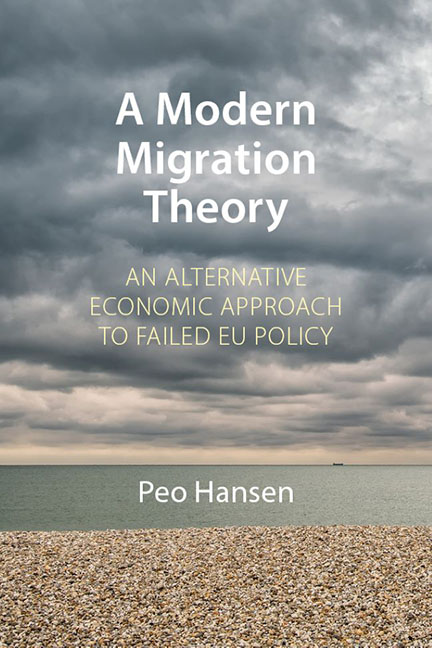Book contents
- Frontmatter
- Dedication
- Contents
- Preface and acknowledgements
- Foreword
- 1 Migration: the “mother of all problems”
- 2 The fiscal impact of migration
- 3 A modern migration theory
- 4 Demography, security and the shifting conjunctures of the European Union’s external labour migration policy
- 5 Labour migration in a sound finance policy logic
- 6 Why EU asylum policy cannot afford to pay demographic dividends
- 7 “We need these people”: refugee spending, fiscal impact and refugees’ real bearing on Sweden’s society and economy
- 8 Conclusion
- Bibliography
- Index
4 - Demography, security and the shifting conjunctures of the European Union’s external labour migration policy
Published online by Cambridge University Press: 20 December 2023
- Frontmatter
- Dedication
- Contents
- Preface and acknowledgements
- Foreword
- 1 Migration: the “mother of all problems”
- 2 The fiscal impact of migration
- 3 A modern migration theory
- 4 Demography, security and the shifting conjunctures of the European Union’s external labour migration policy
- 5 Labour migration in a sound finance policy logic
- 6 Why EU asylum policy cannot afford to pay demographic dividends
- 7 “We need these people”: refugee spending, fiscal impact and refugees’ real bearing on Sweden’s society and economy
- 8 Conclusion
- Bibliography
- Index
Summary
The focus of this chapter and the following one is on the European Union's external labour migration policy. Whereas Chapter 5 takes a detailed look at this policy's directives and their strong correlation with sound finance logic, the present chapter delineates the general historical context of labour migration in the EU, surveying the developments from the early postwar decades to today. Below, I will devote most of my attention to the contemporary consequences of the major shift that took place around the turn of the millennium, when Brussels decided to scrap its three-decade-long “zero” external labour migration policy in favour of a policy able to attract tens of millions of labour migrants over the subsequent decades. Whereas to some this signalled a new openness and a less preventive approach to migration, I will show why it was actually premised on the opposite. More migration was thus perceived as requiring a larger security apparatus in order to ensure that those who come are of the right type and that the length of their stays, access to welfare benefits and other rights can be closely adjusted, monitored and controlled. As I will also elaborate on in the chapters ahead, many of the security measures have been aimed at preventing the entry of asylum seekers, as well as any other type of migrants seen as inflicting fiscal burdens on the welfare systems in the member states.
Before accounting for the broad historical and contemporary developments, a conceptual discussion of labour migration is necessary. This is to underline the importance of knowing what labour migration, as a policy term, really denotes in a European Union dominated by sound finance. How, for instance, should we understand the stratified character of current labour migration policy; and why does current labour migration policy have such an awkward relationship with social rights?
It is important to keep in mind that the European Union's supranational competence over external labour migration (ELM) is weak, to say the least. This is in stark contrast to “free movement”, or EU-internal labour migration, which forms part of the EU's core competence – one of the “four freedoms”.
- Type
- Chapter
- Information
- A Modern Migration TheoryAn Alternative Economic Approach to Failed EU Policy, pp. 73 - 94Publisher: Agenda PublishingPrint publication year: 2021

